Fleurs du Mal Magazine


Or see the index
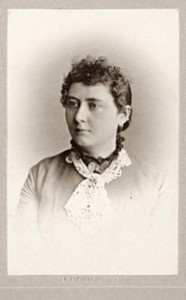
Isabella Valancy Crawford
(1850-1887)
The Ghosts Of The Trees
The silver fangs of the mighty axe,
Bit to the blood of our giant boles;
It smote our breasts and smote our backs,
Thunder’d the front-cleared leaves–
As sped in fire,
The whirl and flame of scarlet leaves
With strong desire
Leaped to the air our captive souls.
While down our corpses thunder’d,
The air at our strong souls gazed and wondered
And cried to us, ‘Ye
Are full of all mystery to me!
I saw but thy plumes of leaves,
Thy strong, brown greaves;
The sinewy roots and lusty branches,
And fond and anxious,
I laid my ear and my restless breast
By each pride-high crest;
And softly stole
And listen’d by limb and listen’d by bole,
Nor ever the stir of a soul,
Heard I in ye–
Great is the mystery!’
The strong, brown eagle plung’d from his peak,
From the hollow iron of his beak;
The wood pigeon fell; its breast of blue
Cold with sharp death all thro’ and thro’,
To our ghosts he cried.
‘With talons of steel,
I hold the storm;
Where the high peaks reel,
My young lie warm.
In the wind-rock’d spaces of air I bide;
My wings too wide–
Too angry-strong for the emerald gyves,
Of woodland cell where the meek dove thrives.
And when at the bar,
Of morn I smote with my breast its star,
And under–
My wings grew purple, the jealous thunder,
With the flame of the skies
Hot in my breast, and red in my eyes;
From peak to peak of sunrise pil’d
That set space glowing,
With flames from air-based crater’s blowing–
I downward swept, beguiled
By the close-set forest gilded and spread
A sea for the lordly tread,
Of a God’s wardship–
I broke its leafy turf with my breast;
My iron lip
I dipp’d in the cool of each whispering crest;
From thy leafy steeps,
I saw in my deeps,
Red coral the flame necked oriole–
But never the stir of a soul
Heard I in ye–
Great is the mystery!’
From its ferny coasts,
The river gazed at our strong, free ghosts,
And with rocky fingers shed
Apart the silver curls of its head;
Laid its murmuring hands,
On the reedy bands;
And at gaze
Stood in the half-moon’s of brown, still bays;
Like gloss’d eyes of stags
Its round pools gaz’d from the rusty flags,
At our ghostly crests
At the bark-shields strong on our phantom breasts;
And its tide
Took lip and tongue and cried.
‘I have push’d apart
The mountain’s heart;
I have trod the valley down;
With strong hands curled,
Have caught and hurled,
To the earth the high hill’s crown!
My brow I thrust,
Through sultry dust,
That the lean wolf howl’d upon;
I drove my tides,
Between the sides,
Of the bellowing canon.
From chrystal shoulders,
I hurled my boulders,
On the bridge’s iron span.
When I rear’d my head
From its old time bed,
Shook the pale cities of man!
I have run a course
With the swift, wild horse;
I have thunder’d pace for pace,
With the rushing herds–
I have caught the beards
Of the swift stars in the race!
Neither moon nor sun
Could me out-run;
Deep cag’d in my silver bars,
I hurried with me,
To the shouting sea,
Their light and the light of the stars!
The reeling earth
In furious mirth
With sledges of ice I smote.
I whirled my sword
Where the pale berg roar’d,
I took the ship by the throat!
With stagnant breath
I called chill Death
My guest to the hot bayou.
I built men’s graves,
With strong thew’d waves
That thing that my strength might do.
I did right well–
Men cried ‘From Hell
The might of Thy hand is given!’
By loose rocks stoned
The stout quays groaned,
Sleek sands by my spear were riven.
O’er shining slides,
On my gloss’d tides,
The brown cribs close woven roll’d;
The stout logs sprung,
Their height among
My loud whirls of white and gold!
The great raft prest,
My calm, broad breast–
A dream thro’ my shady trance,
The light canoe–
A spirit flew–
The pulse of my blue expanse.
Wing’d swift the ships.
My foaming lips
Made rich with dewy kisses,
All night and morn,
Field’s red with corn,
And where the mill-wheel hisses.
And shivers and sobs,
With lab’ring throbs,
With its whirls my strong palms play’d.
I parted my flags,
For thirsty stags,
On the necks of arches laid.
To the dry-vined town
My tide roll’d down–
Dry lips and throats a-quiver,
Rent sky and sod
With shouts ‘From God
The strength of the mighty river!’
I, list’ning, heard
The soft-song’d bird;
The beetle about thy boles.
The calling breeze,
In thy crests, O Trees–
Never the voices of souls!’
* * * * *
We, freed souls, of the Trees look’d down
On the river’s shining eyes of brown;
And upward smiled
At the tender air and its warrior child,
The iron eagle strong and wild.
* * * * *
‘No will of ours,
The captive souls of our barky tow’rs;
‘His the deed
Who laid in the secret earth the seed;
And with strong hand
Knitted each woody fetter and band.
Never, ye
Ask of the tree,
The ‘Wherefore’ or ‘Why’ the tall trees stand,
Built in their places on the land
Their souls unknit;
With any wisdom or any wit,
The subtle ‘Why,’
Ask ye not of earth or sky–
But one command it.
Isabella Valancy Crawford poetry
fleursdumal.nl magazine
More in: Archive C-D, CLASSIC POETRY
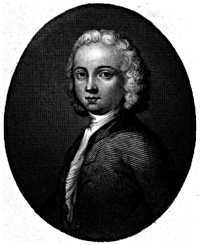
William Collins
(1721 – 1759)
Ode On The Poetical Character
As once, if not with light regard,
I read aright that gifted bard,
(Him whose school above the rest
His loveliest Elfin Queen has blest,)
One, only one, unrival’d fair,
Might hope the magic girdle wear,
At solemn tourney hung on high,
The wish of each love-darting eye;
Lo! to each other nymph in turn applied,
As if, in air unseen, some hov’ring hand,
Some chaste and angel-friend to virgin-fame,
With whisper’d spell had burst the starting band,
It left unblest her loath’d dishonour’d side;
Happier, hopeless fair, if never
Her baffled hand with vain endeavour
Had touch’d that fatal zone to her denied!
Young Fancy thus, to me divinest name,
To whom, prepar’d and bath’d in Heav’n,
The cest of amplest pow’r is giv’n:
To few the god-like gift assigns,
To gird their blest prophetic loins,
And gaze her visions wild, and feel unmix’d her flame!
The band, as fairy legends say,
Was wove on that creating day,
When He, who call’d with thought to birth
Yon tented sky, this laughing earth,
And dress’d with springs, and forests tall,
And pour’d the main engirting all,
Long by the lov’d enthusiast woo’d,
Himself in some diviner mood,
Retiring, sate with her alone,
And plac’d her on his sapphire throne,
The whiles, the vaulted shrine around,
Seraphic wires were heard to sound,
Now sublimest triumph swelling,
Now on love and mercy dwelling;
And she, from out the veiling cloud,
Breath’d her magic notes aloud:
And thou, thou rich-hair’d youth of morn,
And all thy subject life was born!
The dang’rous Passions kept aloof,
Far from the sainted growing woof:
But near it sate ecstatic Wonder
List’ning the deep applauding thunder:
And Truth, in sunny vest array’d,
By whose the tarsel’s eyes were made
All the shad’wy tribes of mind,
In braided dance their murmurs join’d,
And all the bright uncounted Pow’rs
Who feed on Heav’n’s ambrosial flow’rs.
Where is the bard, whose soul can now
Its high presuming hopes avow?
Where he who thinks, with rapture blind,
This hallow’d work for him design’d?
High on some cliff, to Heav’n up-pil’d,
Of rude access, of prospect wild,
Where, tangled round the jealous steep,
Strange shades o’erbrow the valleys deep,
And holy genii guard the rock,
Its glooms embrown, its springs unlock,
While on its rich ambitious head,
An Eden, like his own, lies spread.
I view that oak, the fancied glades among,
By which as Milton lay, his ev’ning ear,
From many a cloud that dropp’d ethereal dew,
Nigh spher’d in Heav’n its native strains could hear:
On which that ancient trump he reach’d was hung;
Thither oft his glory greeting,
From Waller’s myrtle shades retreating,
With many a vow from Hope’s aspiring tongue,
My trembling feet his guiding steps pursue;
In vain—such bliss to one alone,
Of all the sons of soul was known,
And Heav’n, and Fancy, kindred pow’rs,
Have now o’erturn’d th’ inspiring bow’rs,
Or curtain’d close such scene from ev’ry future view.
William Collins poetry
fleursdumal.nl magazine
More in: Archive C-D, CLASSIC POETRY
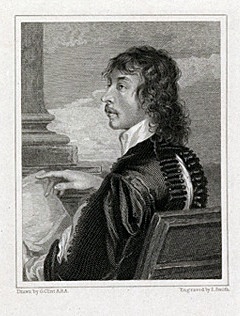
Thomas Carew
(1594-1640)
I Do Not Love Thee For That Fair
I do not love thee for that fair
Rich fan of thy most curious hair;
Though the wires thereof be drawn
Finer than threads of lawn,
And are softer than the leaves
On which the subtle spider weaves.
I do not love thee for those flowers
Growing on thy cheeks, love’s bowers;
Though such cunning them hath spread,
None can paint them white and red:
Love’s golden arrows thence are shot,
Yet for them I love thee not.
I do not love thee for those soft
Red coral lips I’ve kissed so oft,
Nor teeth of pearl, the double guard
To speech whence music still is heard;
Though from those lips a kiss being taken
Mighty tyrants melt, and death awaken.
I do not love thee, O my fairest,
For that richest, for that rarest
Silver pillar, which stands under
Thy sound head, that globe of wonder;
Though that neck be whiter far
Than towers of polished ivory are.
Thomas Carew poetry
fleursdumal.nl magazine
More in: Archive C-D, CLASSIC POETRY
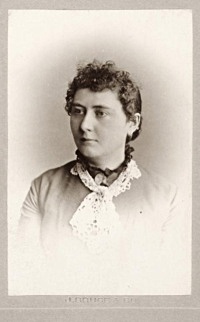
Isabella Valancy Crawford
(1850-1887)
His Sweetheart
Sylvia’s lattices were dark
Roses made them narrow.
In the dawn there came a Spark,
Armd with an arrow:
Blithe he burst by dewy spray,
Winged by bud and blossom,
All undaunted urged his way
Straight to Sylvia’s bosom.
‘Sylvia! Sylvia! Sylvia!’ he
Like a bee kept humming,
‘Wake, my sweeting; waken thee,
For thy Soldier’s coming!’
Sylvia sleeping in the dawn,
Dreams that Cupid’s trill is
Roses singing on the lawn,
Courting crested lilies.
Sylvia smiles and Sylvia sleeps,
Sylvia weeps and slumbers;
Cupid to her pink ear creeps,
Pipes his pretty numbers.
Sylvia dreams that bugles play,
Hears a martial drumming;
Sylvia springs to meet the day
With her Soldier coming.
Happy Sylvia, on thee wait
All the gracious graces!
Venus mild her cestus plait
Round thy lawns and laces!
Flora fling a flower most fair,
Hope a rainbow lend thee!
All the nymphs to Cupid dear
On this day befriend thee!
‘Sylvia! Sylvia! Sylvia!’ hear
How he keeps a-humming,
Laughing in her jewelled ear,
‘Sweet, thy Soldier’s coming!’
Isabella Valancy Crawford poetry
fleursdumal.nl magazine
More in: Archive C-D, CLASSIC POETRY

William Collins
(1721 – 1759)
A Song From Shakespeare’s Cymbeline
To fair Fidele’s grassy tomb
Soft maids and village hinds shall bring
Each op’ning sweet, of earliest bloom,
And rifle all the breathing spring.
No wailing ghost shall dare appear,
To vex with shrieks this quiet grove:
But shepherd lads assemble here,
And melting virgins own their love.
No wither’d witch shall here be seen,
No goblins lead their nightly crew:
The female fays shall haunt the green,
And dress thy grave with pearly dew!
The redbreast oft at ev’ning hours
Shall kindly lend his little aid:
With hoary moss, and gather’d flow’rs,
To deck the ground where thou art laid.
When howling winds, and beating rain,
In tempests shake the sylvan cell,
Or midst the chase on ev’ry plain,
The tender thought on thee shall dwell.
Each lonely scene shall thee restore,
For thee the tear be duly shed:
Belov’d, till life could charm no more;
And mourn’d, till Pity’s self be dead.
William Collins poetry
fleursdumal.nl magazine
More in: Archive C-D, CLASSIC POETRY, Shakespeare, William

Thomas Carew
(1594-1640)
A Cruel Mistress
We read of kings and gods that kindly took
A pitcher fill’d with water from the brook ;
But I have daily tender’d without thanks
Rivers of tears that overflow their banks.
A slaughter’d bull will appease angry Jove,
A horse the Sun, a lamb the god of love,
But she disdains the spotless sacrifice
Of a pure heart, that at her altar lies.
Vesta is not displeased, if her chaste urn
Do with repaired fuel ever burn ;
But my saint frowns, though to her honour’d name
I consecrate a never-dying flame.
Th’ Assyrian king did none i’ th’ furnace throw
But those that to his image did not bow ;
With bended knees I daily worship her,
Yet she consumes her own idolater.
Of such a goddess no times leave record,
That burnt the temple where she was adored.
Thomas Carew poetry
fleursdumal.nl magazine
More in: Archive C-D, CLASSIC POETRY
.jpg)
Daniil Kharms
(1905-1942)
Sommergarten
Michajlov ging durch den Sommergarten,
eine Hängematte unter seinem Arm.
Er suchte ganz lange,
wo er die Hängematte aufhängen könnte.
Doch überall störten die lästigen Wärter.
Michajlov überlegte es sich anders
und setzte sich auf eine Bank.
Auf der Bank lag eine hinter gelassen Zeitung.
Eine hinter gelassen Zeitung.
Michajlov setzte sich auf die Zeitung
Und überlegte schnell weiter.
fleursdumal.nl magazine
More in: Archive C-D, Archive K-L, Kharms (Charms), Daniil
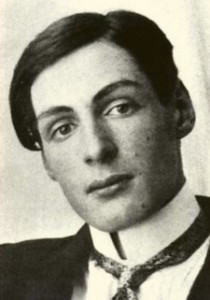 Arthur Cravan
Arthur Cravan
(1887-1918)
ANDRÉ GIDE
Comme je rêvais fébrilement, après une longue période de la pire des paresses, à devenir très riche (mon Dieu ! comme j’y rêvais souvent !) ; comme j’en étais au chapitre des éternels projets, et que je m’échauffais progressivement à la pensée d’atteindre malhonnêtement à la fortune, et d’une manière inattendue, par la poésie — j’ai toujours essayé de considérer l’art comme un moyen et non comme un but — je me dis gaiement : « Je devrais aller voir Gide, il est millionnaire. Non, quelle rigolade, je vais rouler ce vieux littérateur!»
Tout aussitôt, ne suffit-il pas de s’exciter ? je m’octroyais un don de réussite prodigieux ? J’écrivais un mot à Gide, me recommandant de ma parenté avec Oscar Wilde ; Gide me recevait. Je lui étais un étonnement avec ma taille, mes épaules, ma beauté, mes excentricités, mes mots. Gide raffolait de moi, je l’avais pour agréable. Déjà nous filions vers l’Algérie — il refaisait le voyage de Biskra et j’allais bien l’entraîner jusqu’aux Côtes des Somalis. J’avais vite une tête dorée, car j’ai toujours eu un peu honte d’être blanc. Et Gide payait les coupés de 1re classe, les nobles montures, les palaces, les amours. Je donnais enfin une substance à quelques-unes de mes milliers d’âmes. Gide payait, payait, payait toujours ; et j’ose espérer qu’il ne m’attaquera point en dommages et intérêts si je lui fait l’aveu que dans les dévergondages malsains de ma galopante imagination il avait vendu jusqu’à sa solide ferme de Normandie pour satisfaire à mes derniers caprices d’enfant moderne !
Ah ! je me revois encore tel que je me peignais alors, les jambes allongées sur les banquettes du rapide méditerranéen, débitant des inconcevabilités pour divertir mon Mécène.
On dira peut-être de moi que j’ai des mœurs d’Androgide. Le dira-t-on?
Au reste, j’ai si peu réussi dans mes petits projets d’exploitation que je vais me venger. J’ajouterais, afin de ne pas alarmer inconsidérément nos lecteurs de province, que je pris surtout en grippe M. Gide, le jour où, comme je le fais entendre plus haut, je me rendis compte que je ne tirerai jamais dix centimes de lui, et que, d’autre part, cette jaquette râpée se permit d’éreinter, pour des raisons d’excellence, le chérubin nu qui a nom Théophile Gautier.
J’allais donc voir M. Gide. Il me revient qu’à cette époque je n’avais pas d’habit, et je suis encore à le regretter, car il m’aurait été facile de l’éblouir. Comme j’arrivais près de sa villa, je me récitais les phrases sensationnelles que je devais placer au cours de la conversation. Un instant plus tard je sonnais. Une bonne vint m’ouvrir (M. Gide n’a pas de laquais). L’on me fit monter au premier et l’on me pria d’attendre dans une sorte de petite cellule qu’assurait un corridor tournant à angle droit. En passant je jetais un œil curieux dans différentes pièces, cherchant à prendre par avance quelques renseignements sur les chambres d’amis. Maintenant j’étais assis dans mon petit coin. Des vitraux, que je trouvais toc, laissaient tomber le jour sur un écritoire où s’ouvraient des feuillets fraîchement mouillés d’encre. Naturellement, je ne fis pas faute de commettre la petite indiscrétion que vous devinez. C’est ainsi que je peux vous apprendre que M. Gide châtie terriblement sa prose et qu’il ne doit guère livrer aux typographes que le quatrième jet.
La bonne vint me reprendre pour me conduire au rez-de-chaussée. Au moment d’entrer dans le salon, de turbulents roquets jetèrent quelques aboiements. Cela allait-il manquer de distinction ? Mais M. Gide allait venir. J’eus pourtant tout le loisir de regarder autour de moi. Des meubles modernes et peu heureux dans une pièce spacieuse ; pas de tableaux, des murs nus (une simple intention ou une intention un peu simple) et surtout une minutie très protestante dans l’ordre et la propreté. J’eus même, un instant, une sueur assez désagréable à la pensée que j’avais peut-être saligoté les tapis. J’aurais probablement poussé la curiosité un peu plus loin, ou j’aurais même cédé à l’exquise tentation de mettre quelque menu bibelot dans ma poche, si j’avais pu défendre de la sensation très nette que M. Gide se documentait par quelque petit trou secret de la tapisserie. Si je m’abusai, je prie M. Gide de bien vouloir accepter les excuses publiques et immédiates que je dois à sa dignité.
Enfin l’homme parut. (Ce qui me frappa le plus depuis cette minute, c’est qu’il ne m’offrit absolument rien, si ce n’est une chaise, alors que, sur les quatre heures de l’après-midi, une tasse de thé, si l’on prise l’économie, ou mieux encore quelque liqueur et le tabac d’Orient passent avec raison, dans la société européenne, pour donner cette disposition indispensable qui lui permet d’être parfois étourdissante.)
« Monsieur Gide, commençai-je, je me suis permis de venir à vous, et cependant je crois devoir vous déclarer tout de go que je préfère de beaucoup, par exemple, la boxe à la littérature.
— La littérature est pourtant le seul point sur lequel nous puissions nous rencontrer, me répondit assez sèchement mon interlocuteur.
Je pensais : ce grand vivant !
Nous parlâmes donc littérature, et comme il allait me poser cette question qui devait lui être particulièrement chère : « Qu’avez-vous lu de moi ? » J’articulais sans sourciller, en logeant le plus de fidélité possible dans mon regard : « J’ai peur de vous lire. » J’imagine que M. Gide dut singulièrement sourciller.
J’arrivais alors petit à petit à placer mes fameuses phrases, que tout à l’heure je me récitais encore, pensant que le romancier me saurait gré de pouvoir après l’oncle utiliser le neveu. Je jetais d’abord négligemment : « La Bible est le plus grand succès de librairie. » Un moment plus tard, comme il montrait assez de bonté pour s’intéresser à mes parents : « Ma mère et moi, dis-je assez drôlement, nous ne sommes pas nés pour nous comprendre. » La littérature revenant sur le tapis, j’en profitais pour dire du mal d’au moins deux cents auteurs vivants, des écrivains juifs, et de Charles-Henri Hirsch en particulier, et d’ajouter : « Heine est le Christ des écrivains juifs modernes. » Je jetais de temps à autre de discrets et malicieux coups d’œil à mon hôte, qui me récompensait de rires étouffés, mais qui, je dois bien le dire, restait très loin derrière moi, se contentant, semblait-il, d’enregistrer, parce qu’il n’avait probablement rien préparé.
À un moment donné, interrompant une conversation philosophique, m’étudiant à ressembler à un Bouddha qui aurait descellé une fois pour dix mille ans ses lèvres : « La grande Rigolade est dans l’Absolu », murmurai-je. Sur le point de me retirer, d’un ton très fatigué et très vieux, je priais : « Monsieur Gide, où en sommes-nous avec le temps ? » Apprenant qu’il était six heures moins un quart, je me levais, serrais affectueusement la main de l’artiste, et partais en emportant dans ma tête le portrait d’un de nos plus notoires contemporains, portrait que je vais resquisser ici, si mes chers lecteurs veulent bien m’accorder encore, un instant, leur bienveillante attention.
M. Gide n’a pas l’air d’un enfant d’amour, ni d’un éléphant, ni de plusieurs hommes : il a l’air d’un artiste ; et je lui ferai ce seul compliment, au reste désagréable, que sa petite pluralité provient de ce fait qu’il pourrait très aisément être pris pour un cabotin. Son ossature n’a rien de remarquable ; ses mains sont celles d’un fainéant, très blanches, ma foi ! Dans l’ensemble, c’est une toute petite nature. M. Gide doit peser dans les 55 kg et mesurer 1,65 m environ. Sa marche trahit un prosateur qui ne pourra jamais faire un vers. Avec ça, l’artiste montre un visage maladif, d’où se détachent, vers les tempes, de petites feuilles de peau plus grandes que des pellicules, inconvénient dont le peuple donne une explication, en disant vulgairement de quelqu’un : « il pèle».
Et pourtant l’artiste n’a point les nobles ravages du prodigue qui dilapide et sa fortune et sa santé. Non, cent fois non : l’artiste semble prouver au contraire qu’il se soigne méticuleusement, qu’il est hygiénique et qu’il s’éloigne d’un Verlaine qui portait sa syphilis comme une langueur, et je crois, à moins d’un démenti de sa part, ne pas trop m’aventurer en affirmant qu’il ne fréquente ni les filles ni les mauvais lieux ; et c’est bien encore à ces signes que nous sommes heureux de constater, comme nous aurions eu souvent l’occasion de le faire, qu’il est prudent.
Je ne vis M. Gide qu’une fois dans la rue : il sortait de chez moi : il n’avait que quelques pas à faire avant de tourner la rue, de disparaître à mes yeux; et je le vis s’arrêter devant un bouquiniste : et pourtant il y avait un magasin d’instruments chirurgicaux et une confiserie…
Depuis, M. Gide m’écrivit une fois*, et je ne le revis jamais.
J’ai montré l’homme, et maintenant j’eusse volontiers montré l’œuvre si, sur un seul point, je n’eusse pas eu besoin de me redire.
Arthur Cravan: André Gide
Revue Maintenant n°2 (juillet 1913)
fleursdumal.nl magazine
More in: Archive C-D, Cravan, Arthur, Dada
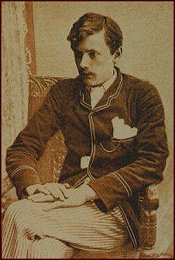
Ernest Dowson
(1867-1900)
Amor Profanus
Beyond the pale of memory,
In some mysterious dusky grove;
A place of shadows utterly,
Where never coos the turtle-dove,
A world forgotten of the sun:
I dreamed we met when day was done,
And marvelled at our ancient love.
Met there by chance, long kept apart,
We wandered through the darkling glades;
And that old language of the heart
We sought to speak: alas! poor shades!
Over our pallid lips had run
The waters of oblivion,
Which crown all loves of men or maids.
In vain we stammered: from afar
Our old desire shone cold and dead:
That time was distant as a star,
When eyes were bright and lips were red.
And still we went with downcast eye
And no delight in being nigh,
Poor shadows most uncomforted.
Ah, Lalage! while life is ours,
Hoard not thy beauty rose and white,
But pluck the pretty fleeing flowers
That deck our little path of light:
For all too soon we twain shall tread
The bitter pastures of the dead:
Estranged, sad spectres of the night.
Ernest Dowson poetry
fleursdumal.nl magazine
More in: Archive C-D, Dowson, Ernest
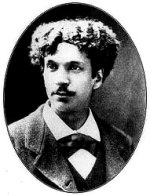
Charles Cros
(1842 – 1888)
Six tercets
A Degas
Les cheveux plantureux et blonds, bourrés de crin.
Se redressent altiers : deux touffes latérales
Se collent sur le front en moqueuses spirales.
Aigues-marines. dans le transparent écrin
Des paupières, les yeux qu’un clair fluide baigne
Ont un voluptueux regard qui me dédaigne.
Tout me nargue : les fins sourcils, arcs indomptés.
Le nez”au flair savant, la langue purpurine
Oui s’allonge jusqu’à chatouiller la narine.
Et le menton pointu, signe des volontés
Implacables, et puis cette irritante mouche
Sise au-dessous du nez et tout près de la bouche.
Mais, au bout du menton rose où vient se poser
In doigt mignon, dans cette attitude songeuse,
Énigmatiquement la fossette se creuse.
Je prends, à la faveur de ce calme, un baiser
Sur les flocons dont la nuque fine est couverte,
En prix de ce croquis rimé d’après vous,
Berthe.
Charles Cros poetry
fleursdumal.nl magazine
More in: Archive C-D, Cros, Charles

Ernest Dowson
(1867-1900)
The Dead Child
Sleep on, dear, now
The last sleep and the best,
And on thy brow,
And on thy quiet breast
Violets I throw.
Thy scanty years
Were mine a little while;
Life had no fears
To trouble thy brief smile
With toil or tears.
Lie still, and be
For evermore a child!
Not grudgingly,
Whom life has not defiled,
I render thee.
Slumber so deep,
No man would rashly wake;
I hardly weep,
Fain only, for thy sake,
To share thy sleep.
Yes, to be dead,
Dead, here with thee to-day,
When all is said
’Twere good by thee to lay
My weary head.
The very best!
Ah, child so tired of play,
I stand confessed:
I want to come thy way,
And share thy rest.
Ernest Dowson poetry
fleursdumal.nl magazine
More in: Archive C-D, Dowson, Ernest

Charles Cros
(1842 – 1888)
Chant éthiopien
Chanson a Emile Wroblewski
Apportez-moi des fleurs odorantes,
Pour me parer, compagnes errantes,
Pour te charmer, ô mon bien-aimé.
Déjà le vent s’élève embaumé.
Le vent du soir fait flotter vos pagnes.
Dans vos cheveux, pourquoi, mes compagnes,
Entrelacer ces perles de lait?
Mon cou — dit-il — sans perles lui plaît.
Mon cou qu’il prend entre ses bras souples
Frémit d’amour.
Nous voyons par couples,
Tout près de nous, entre les roseaux,
Dans le muguet, jouer les oiseaux.
Le blanc muguet fait des perles blanches.
Mon bien-aimé rattache à mes hanches
Mon pagne orné de muguet en fleur;
Mes dents — dit-il — en ont la pâleur.
Mes blanches dents et mon sein qui cède
Mes longs cheveux, lui seul les possède.
Depuis le soir où son œil m’a lui,
11 est à moi; moi je suis à lui.
Charles Cros poetry
fleursdumal.nl magazine
More in: Archive C-D, Cros, Charles
Thank you for reading Fleurs du Mal - magazine for art & literature